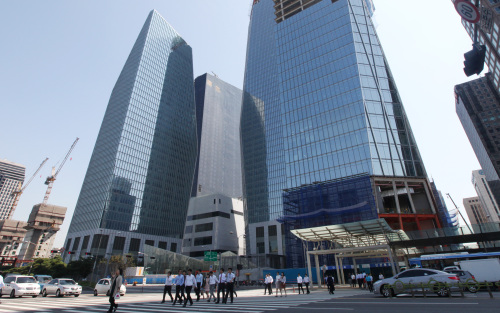Korea’s financial regulators said they were considering measures to address the controversy over generous salaries and dividends in the banking, securities and other financial sectors.
“Modifying the regulatory system is now being reviewed concerning some of the high compensation executives in the financial sector receive,” said an official from the Financial Services Commission.
“It’s difficult for a third party to intervene in salary and dividend payouts, but some financial firms’ quick delivery of sizable dividends after receiving government rescue funds is certainly a problem to be resolved,” the official said maintaining customary anonymity.
The move came as many people feel increasingly left behind in this protracted economic slump while top executives in the financial sector benefit from handsome pay packages as well as other benefits.
A similar line of anger is spawning demonstrations on Wall Street in the U.S. and other countries, raising the issue of a growing disparity in wealth amid the economic downturn across the globe.
Korea’s financial regulators are now expected to focus on asking financial firms to stack up more in-house reserves, which will result in a smaller amount of dividend payouts.
 |
(Yonhap News) |
<한글기사>
금융권 `급여ㆍ배당 탐욕' 제동건다
4대 금융지주 5년간 4조 배당…증권사는 더 심각
금융당국이 은행, 증권사 등 금 융권의 높은 급여와 배당 문제를 개선하는 작업에 착수했다.
금융위원회 관계자는 16일 "과도하게 많다는 지적을 받는 금융회사의 급여와 배 당 문제에 관해 제도적으로 보완하는 방안이 있는지 검토하고 있다"고 밝혔다.
이 관계자는 "시장경제 사회에서 임금이나 배당 관행에 제삼자가 간섭하기는 쉽 지 않지만, 금융회사들이 문제가 터질 때 정부로부터 도움을 받고 이익이 생기면 곧 바로 배당에 나서는 것은 분명히 문제가 크다"고 지적했다.
금융당국이 성과급 가이드라인, 배당 비율 등을 제시하기는 어렵지만, 대손충당 금이나 내부유보금을 많이 쌓도록 유도함으로써 배당을 줄이는 방안을 검토할 것으 로 보인다.
김석동 금융위원장은 최근 "억대 연봉 체계에 대해 금융권 스스로 답을 내야 한 다"고 말했다. 배당문제에는 "위기를 앞두고 흥청망청할 수 없고 스스로 지킬 노력 을 해야 한다"고 강조했다.
실제로 은행과 증권사 등 금융회사들의 급여와 배당은 지나치게 많다는 지적을 받아왔다.
최근 5년간(2006~2010년도) 신한금융지주, 우리금융지주, KB금융지주, 하나금융 지주 등 4대 금융지주사 배당금은 3조8천억원으로 5년간 순이익(22조원)의 17.5%에 달했다. 지주사별로 신한 22.9%, 우리 14.6%, 하나 11.5%, KB 9.7% 등이었다.
증권사 배당은 더욱 많다. 삼성증권, 대우증권, 우리투자증권, 현대증권, 한국 투자증권 등 5대 증권사는 5년간 순익(5조6천억원)의 32.4%(1조8천억원)를 배당금으로 줬다.
대신증권(72.0%)과 하나대투증권(66.3%), 한양증권(56.7%), 유화증권(5
6.4%)은 5년간 평균 배당성향이 50%가 넘었다.
삼성경제연구소 전효찬 수석연구원은 "지금 금융권은 비판의 대상이 되고 있다"
며 "왜 배당 성향이 다른 업종보다 높은지 설명하지 못한다면 배당을 자제해야 한 다"고 지적했다.
주요 금융회사 직원의 급여는 삼성전자를 능가할 정도다.
올해 들어 4대 금융지주사 직원 월급은 1인당 평균 627만원이다. 신한 752만원, KB금융 627만원, 하나금융 597만원, 우리금융 530만원이다.
또 한국투자증권(876만원), 하나대투증권(807만원), 삼성증권(768만원) 등 10대 증권사 평균은 661만원으로 삼성전자(554만원), 현대차(489만원) 등 국내 주요 수출 기업을 크게 앞섰다. (연합뉴스)



![[Herald Interview] 'Trump will use tariffs as first line of defense for American manufacturing'](http://res.heraldm.com/phpwas/restmb_idxmake.php?idx=644&simg=/content/image/2024/11/26/20241126050017_0.jpg)

![[Health and care] Getting cancer young: Why cancer isn’t just an older person’s battle](http://res.heraldm.com/phpwas/restmb_idxmake.php?idx=644&simg=/content/image/2024/11/26/20241126050043_0.jpg)

